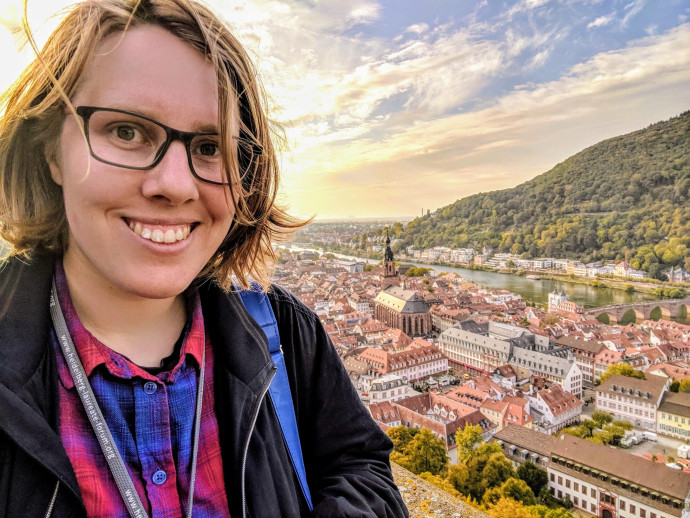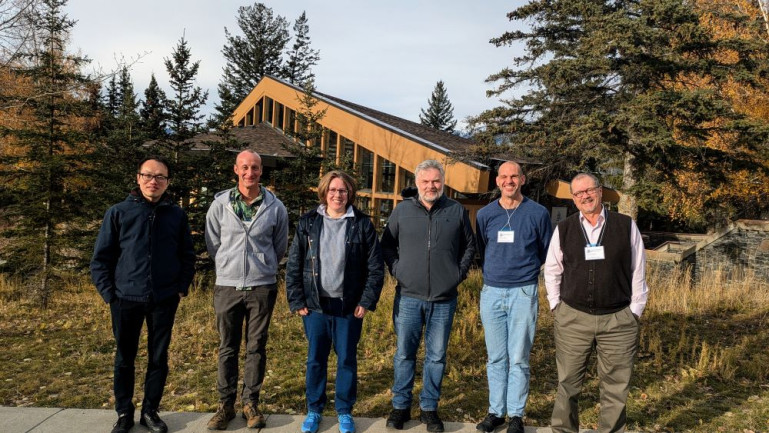Research
Published 14 October 2025Ada Lovelace Day 2025 Special Feature: Getting abstract with Dr Becky Armstrong

Ada Lovelace Day is an opportunity to honour the legacy of pioneering mathematician Ada Lovelace by putting the spotlight on talented wāhine working in science, technology, engineering and mathematics (STEM)
For Ada Lovelace Day 2025 (Rātū 14 Whiringa-ā-nuku Tuesday 14th October), we are featuring a conversation with Marsden Fund Fast-Start awardee Dr Becky Armstrong (Te Herenga Waka―Victoria University of Wellington). Read on to learn more about her cutting-edge work in the fields of Operator Algebra and Abstract Algebra and about her career as a pure mathematician.
Why is research in pure mathematics (and in Operator Algebra and Abstract Algebra specifically) important?
"Pure mathematics research in general is important because it develops the essential mathematical theory necessary to drive future breakthroughs in science, technology, and engineering. As a cryptography fan, my favourite example of this is the way that number theory research, which began hundreds of years before the internet existed, now forms the basis for the security algorithms protecting all of our data!
Operator Algebra provides the mathematical framework for quantum mechanics, and Abstract Algebra has applications in many fields, including computer science, biology, and physics. So developments in Operator Algebra and Abstract Algebra have the potential to lead to many different scientific and technological breakthroughs, perhaps in 50 or 100 years, or even further down the track. The specific breakthroughs are difficult to predict, and so we develop the theory as much as we can so that it will be as useful as possible in the future."
Can you tell us more about your recent Marsden Fast-Start grant?
"In 2024, I received a Marsden Fund Fast-Start grant to investigate the use of coordinate systems called "twisted groupoids" as a framework for better understanding the structure of operator-algebraic and abstract-algebraic objects of interest. The Associate Investigator on the project is Distinguished Professor Benjamin Steinberg (City College of New York), who is a world-leading abstract-algebraist.
Our project aims to build new tools and techniques to solve problems in Operator Algebra and Abstract Algebra, and to strengthen mathematical connections between the two fields, so that future breakthroughs in one field can be more readily translated to the other via the "bridge" of twisted groupoids. I am also passionate about education and training, and am currently supervising a PhD student, Ryan Thompson, who is funded by the Fast-Start Grant."
What first encouraged you to pursue a career in pure mathematics?
"In undergrad I completed a double degree in Mathematics and Computer Science with Honours in Mathematics, and I had a vague plan of either trying to find a programming job in industry afterwards, or of becoming a high-school maths/compsci teacher. One day towards the end of Honours, I unexpectedly received the news that I'd been awarded a PhD scholarship that I hadn't even applied for! This got me thinking about how I'd really enjoyed the research in pure mathematics that I'd done during my Honours year, so I decided to give the PhD a go, and it ended up being a lot of fun! During my PhD I got the opportunity to lecture some large first-year courses, and I really enjoyed both the teaching and research parts of the academic life, so after that it felt like it made perfect sense to pursue an academic career in pure mathematics."

Dr Becky Armstrong with her PhD supervisors and examiners at the Banff International Research Station, five years after receiving her PhD. From left to right: Professor Xin Li, Professor Rufus Willett, Dr Becky Armstrong, Associate Professor Nathan Brownlowe, Professor Aidan Sims, Professor Ian Putnam (photo supplied)
What do you like most about your research?
"During my undergrad degree I particularly enjoyed subjects like algebra, topology, and analysis. My research areas of Operator Algebra and Abstract Algebra combine all of these topics together in lots of interesting ways, and so I love that my job involves continuing to learn about these topics. It's also really satisfying when I'm able to use the new knowledge I acquire to solve interesting problems! And I enjoy the process of figuring out how to logically structure my work into publishable form and of trying to communicate my results clearly in written and spoken form."
What does your job look like day-to-day?
"It varies a lot! Some days I'm more focussed on trying to prove theorems, which involves a cycle of reading maths papers and books to help me learn what I need to know, then attempting to scribble down a proof, then realising I'm stuck, then repeating this process, and hopefully eventually proving something – often over many days or weeks. Sometimes I do this work alone, and other days I work with collaborators (either in person, or online if they're international collaborators), or I work with the PhD student I'm currently co-supervising. Other days I'm more focussed on communicating my research, so I'll be writing and editing papers for publication, or preparing talks to give at conferences and seminars. And other days I'm more focussed on teaching than on research, so I'll be writing and giving lectures, preparing assignment and exam questions, answering students' questions, and other jobs like that."
What advice would you give to others considering careers in mathematics?
"When I was first considering a career in mathematics, my ideas of which jobs sounded enjoyable or unenjoyable probably didn't really have much basis in reality, because I didn't know much about what the jobs actually involved on a day-to-day basis. So one bit of advice I’d give is to attend careers events and chat to lots of people with mathematical jobs to find out what their daily life looks like. Something else I'm very glad I did was to make use of my uni holidays every year to get a taste for various different career paths. So if you're a uni student who is thinking of working in industry, apply for holiday internships to find out what sorts of jobs you might enjoy. Or if you'd like to go into academia, ask your lecturers if there are any holiday research scholarships you could apply for to give you an idea of what it's like to do research in a specific field."
RESEARCHER
Dr Becky Armstrong
ORGANISATION
Te Herenga Waka―Victoria University of Wellington
FUNDING SUPPORT
Marsden Fund
CONTRACT OR PROJECT ID
VUW2411
